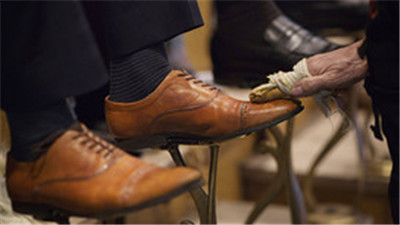Last Thursday, for the first time in my life, I had my shoes shined. I sat on a stool outside St Mary-le-Bow on Cheapside and a man crouched at my feet and got busy with the Kiwi polish, rags and brushes.
上周四,我有生以来第一次请人擦鞋。我坐在切普赛街圣玛丽勒波教堂(St Mary-le-Bow)外面的一个凳子上,一位男子蹲在我脚边,用奇伟(Kiwi)鞋油、擦鞋布和鞋刷忙碌起来。
It had never occurred to me to do such a thing before. This is partly because I don’t notice scuffed shoes until they are shamefully tatty, when I generally turn to and polish them myself. More than that, there is something disagreeable about the idea of someone prostrating themselves at your feet.
以前我从没想过这么做。这在一定程度上是因为除非鞋子邋遢得丢人了,否则我是不会注意到鞋子有磨损的,而且那时我一般会自己擦鞋。更主要的原因是,我对于别人蹲在脚下为我服务还是有些介怀的。

When I worked on Wall Street in the early 1980s, I remember seeing lines of men in suits sitting on high chairs loftily reading the Wall Street Journal while men in dirty aprons toiled away below them. My liberal north London soul winced at the sight.
上世纪80年代初,在华尔街工作的我看到很多西装革履的男士坐在高椅上高傲地读着《华尔街日报》(Wall Street Journal),而身穿脏围裙的擦鞋匠在他们脚下卖力工作。我这颗北伦敦的自由心灵真不愿意看到这一幕。
But then last week a colleague told me he had just had his shoes shined by a man who struck him as one of the most contented workers he’d ever met. Intrigued, I decided to pay him a visit.
但上周,一位同事告诉我,刚刚给他擦鞋的人是他遇到的最心满意足的工作者之一。对此好奇的我决定前去拜访。
Earlier that week I had been at a formal dinner and sat next to a woman who held down a senior job in a large City bank. I asked her if she liked being a banker — and got an earful of disillusionment and misery. Anyone planning on a career in financial services, she said, was quite mad. First, the weight of regulation was making life impossible. Then there was the politics, and the endless need to show off. Sexism was endemic. And bureaucracy and the culture of back covering were so entrenched that change was impossible. She had made enough money in her two decades in the job never to have to work again, and was feeling gleeful at having just handed in her notice.
当周早些时候,我出席过一次正式的餐会,在我旁边就坐的一位女性辞去了伦敦金融城(City)一家大银行的高级职位。我问她是否喜欢银行家这份工作,结果我听到的是很多的失望和不愉快。她说道,任何一位计划在金融服务业大展宏图的人都非常疯狂。首先,严格的监管让业务变得难上加难。接下来还有政治,还需要无休止地炫耀。性别歧视很普遍。官僚作风和掩盖文化非常根深蒂固,改革几乎是不可能的。工作了20年,她赚够了钱,永远不需要再工作了,刚刚很高兴地递交了辞呈。
At around the time she joined her bank, a young French graduate turned up at a church barely 100 yards from the glass and marble headquarters where she worked, and sought permission to shine shoes in its courtyard. For nearly 20 years he has turned up at 11.30am each day, put up a green umbrella, and applied himself to the shoe leather of the City lunch- break crowd.
大约在她加入她所在的银行时,一位年轻的法国毕业生出现在一个教堂,距离她工作的玻璃和大理石外墙的公司总部仅有100码,他希望获得许可在教堂庭院里擦鞋。近20年来,他每天11:30出现,撑起一把绿伞,然后投入工作,为伦敦金融城午餐休息的员工擦鞋。
This work, you might have thought, would be as bad as it gets. Shoe shining is what children in Mumbai do when they have lost a father and need to do something to avoid starvation. It is even worse than going up a chimney — that doesn’t require grovelling at the feet of another person.
你可能会认为,这份工作再糟糕不过了。擦鞋一般是失去父亲、需要养家糊口的孟买小孩们所做的工作。它甚至比扫烟囱还要低贱,后者不需要卑躬屈膝地匍匐在别人脚下。
But Marc tells another story. When he came to London in the early 1990s he was hoping to work in media. But as the company he interned for paid nothing, he financed that work with shoe shining. After a while he discovered that the media company was phoney; he found greater satisfaction with a can of polish and a brush.
但马克(Marc)的想法却恰恰相反。上世纪90年代初,他来到伦敦,希望在媒体工作。但他实习的公司不提供薪资,他依靠擦鞋维持了生计。不久他发现这家媒体公司是个骗子;而他在鞋油和鞋刷中找到了更大的满足感。
As he rubbed and scrubbed at my black ankle boots, I asked precisely what it was about the job he liked so much. “I don’t have to be clever,” he said. “I can be as dumb as I like. I’m not trying to impress anyone.”
当他擦我的黑色及踝靴时,我直接问他为什么这么喜欢这份工作。“我不需要聪明,”他回答,“我可以尽情当个笨人。我不用费力打动别人。”
This is an excellent point. I spend half my life trying to impress people — and it’s exhausting. The only thing worse than pretending to be clever yourself is working with people who are pretending even more effectively than you are. Which is what my dinner mate was up against.
这番道理妙极了。我的上半辈子都在努力打动别人,这让人筋疲力尽。唯一比装聪明更糟的事情是与那些装聪明装得更像的人共事。这就是餐会上那位女士所经历的。
The next good thing about the work, he said, was the satisfaction in the job itself. You take a pair of dull shoes and eight minutes later they are sparkling. I can relate to this too. One of the great things about being a journalist — as opposed to being a banker — is the satisfaction that comes from producing work that is finite and that you can see.
他表示,这份工作的第二个优点在于工作本身所带来的满足感。一开始摆在你面前的是一双黯淡无光的鞋子,8分钟后,它们就变得光亮如新。我对此深有体会。身为记者(而非银行家)的一大优点是创作作品所带来的满足感,这种作品是有形、看得见的。
Third, and possibly most important of all, is that shoe shining, in marked contrast to banking, gives its customers pleasure. As I walked off with my boots gleaming, I felt better, smarter, more in control. Making someone else feel good is always a reliable source of happiness. That is why hairdressers and beauticians are higher up the list of happy professions than management consultants and corporate lawyers. As a journalist, I try to give readers pleasure too, but I never witness people enjoying my articles. With the shoe shine the pleasure is instant and right under your nose.
第三,或许也是最重要的一点,是擦鞋会给顾客带来愉悦,这与银行业形成鲜明对比。当我蹬着光亮如新的靴子离开时,我感觉自己心情更好、形象更光鲜而且更加自如。让别人感觉良好永远是快乐的一个可靠来源。正因如此,美发师和美容师这类职业要比管理咨询顾问和公司律师更快乐。作为记者,我也试图给读者带来快乐,但我从未亲眼看到读者开心地读我的文章。擦鞋所带来的愉悦是即刻的,而且就在眼前。
Fourth, the chat is nice. According to Marc most people in the City are starved of decent conversation, and longing to tell their shoe shine man all sorts of interesting — and sometimes scurrilous — things.
第四,聊天让人愉快。马克说,伦敦金融城的多数人都渴望像样的谈话,他们迫不及待地要告诉擦鞋匠各种各样有趣(有时是龌龊)的事情。
Finally, he chooses his own hours. So he shines shoes at lunchtime when trade is brisk, and works as a translator the rest of the time. There is no management, no politics.
最后,他可以自由选择工作时间。因此他在生意兴隆的午餐时分擦鞋,其余时间则在做翻译。这里不存在管理,也没有政治。
There is only one thing that is better about being a banker than shining shoes and that is the money. Marc charges £4.50 for a shine, which means he gets about £30 an hour.
与擦鞋相比,当银行家唯一的优势在于收入。马克每擦一次鞋收费4.50英镑,这意味着他的时薪是30英镑左右。
He hasn’t made enough money to retire. But that is OK because he doesn’t really want to.
他还没有赚够钱退休。但这无所谓,因为他实际上也不想退休。













